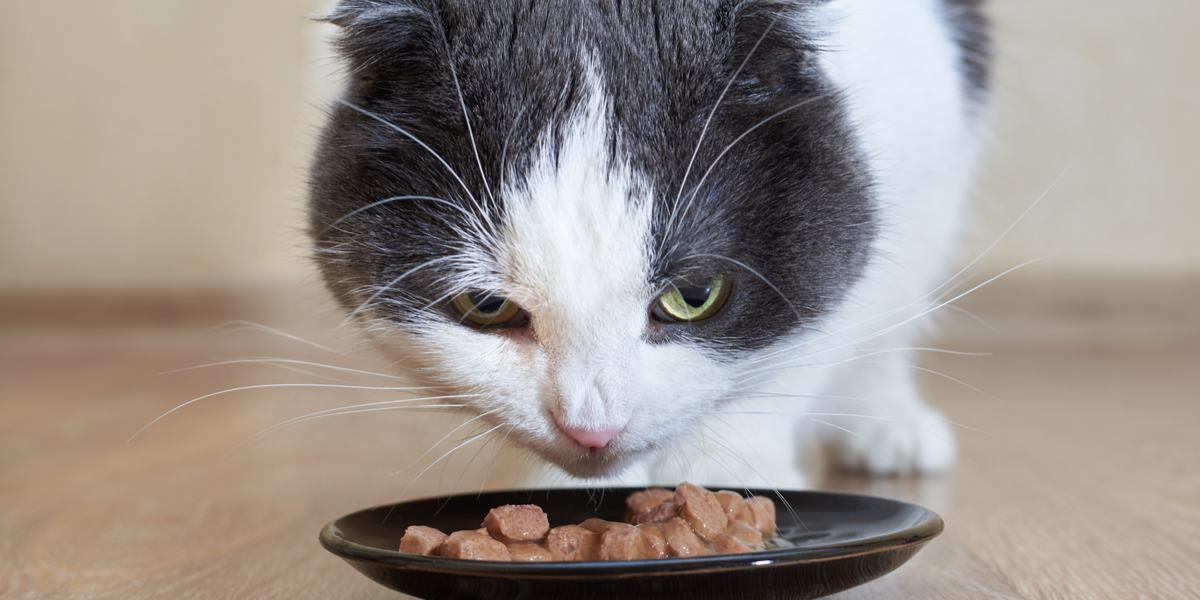
Shutterstock.com
It’s not difficult to picture a wild cat chasing a rabbit across the plains, but is rabbit an appropriate choice for domestic cats?
In this guide, we’ll answer the question “is rabbit good for cats?” and discuss the situations in which you might consider feeding your cat a rabbit-based diet. We’ll also explore our top picks for the best rabbit cat food on the market.
At a Glance: Best Cat Food With Rabbit




Want a quick look at the best cat foods reviewed in this article? In the comparison table below, we’ve highlighted some of the most important features of each product. You’ll find more detailed information about each product later in the article.

Vital Essentials Freeze-Dried Raw Rabbit Mini Nibs Entree Cat Food
- High-quality rabbit as a single source of animal protein
- Doesn’t contain any added plant ingredients
- Rich in skin and coat supporting omega-3 fatty acids
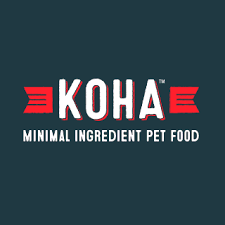
Koha Limited Ingredient Diet Rabbit Au Jus for Cats
- Made with a single source of novel animal protein
- Rich in moisture to support your cat’s hydration
- Easily digestible, only a few main ingredients
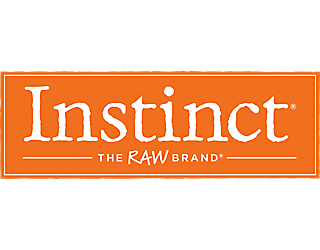
Instinct Limited Ingredient Diet Grain-Free Recipe with Real Rabbit Freeze-Dried Raw Coated Cat Food
- First five ingredients are all animal-based
- Contains nearly 45% dry matter crude protein
- Coated with freeze-dried rabbit for flavor

Lotus Rabbit Grain-Free Pate Canned Cat Food
- Nine of the top ten ingredients (minus water) are animal based
- Comprised primarily of muscle meat, organ meat, and bone
- Rich in moisture to support your cat’s hydration
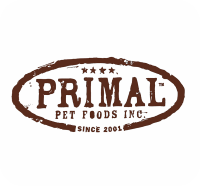
Primal Nuggets Rabbit Formula Nuggets Grain-Free Raw Freeze-Dried Cat Food
- Rich in rabbit, rabbit bone, and rabbit organs
- Made with a single source of high-quality animal protein
- Two sources of added animal-based fat
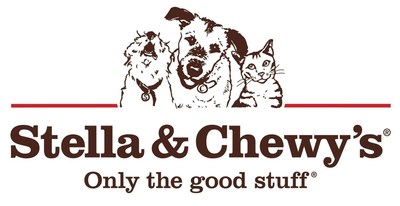
Stella & Chewy’s Absolutely Rabbit Dinner Morsels
- Top two are species-appropriate animal ingredients
- Muscle meat, ground bone, and organ meat provides balanced nutrition
- Supplemented with probiotics to support digestive health

Smallbatch Pets Rabbit Blend Raw Frozen Cat Food
- Made with 97% rabbit (including bone)
- Raw frozen to preserve nutritional integrity
- Finely ground for palatability and easy chewing

Merrick Backcountry Grain-Free Morsels in Gravy Real Rabbit Recipe
- Rich in species-appropriate animal protein
- Packed with hydration-supporting moisture
- Adds protein, moisture, and flavor to your cat’s diet
Why Trust Cats.com?
As the owner of a cat with multiple food allergies, I’ve spent the past decade rotating through different novelty diets. Rabbit is the only protein my cat, Biscuit, has never had a negative reaction to. To supplement my personal experience with rabbit-based cat foods for this review, I performed in-depth market research, read customer reviews, and analyzed product labels to determine the products’ nutritional value, quality, and cat-friendliness.
In addition to evaluating these products objectively, I tested them at home with the help of my three cats. In testing these products, I made observations about the food’s appearance, texture, and smell. My cats provided their input on taste, palatability, and general appeal. I also made notes about the packaging, in terms of its attractiveness, ease of use, and eco-friendliness.
Is Rabbit Good For Cats?
The most important thing any cat owner needs to know about their feline friend is that he is an obligate carnivore. This simply means that cats require animal protein in their daily diet.
As long as your cat’s diet is packed with animal protein, you’re pretty much free to choose any recipe you like. It’s worth considering, however, the type of protein you choose for your cat. Some are more species-appropriate than others, and cats with allergies may not be able to tolerate certain ones.
Rabbit is an excellent protein choice for cats because it’s a component of a natural feline diet.
That being said, rabbits do not make up the majority of the diet for most wild cats. It’s a healthy and biologically appropriate option, but not necessarily moreso than other proteins.
Rabbit meat is fairly low in calories because the meat is very lean. Compared to fattier proteins like beef (250 kcal per 100 g serving) and fish (142 kcal per 100g serving), rabbit contains just 96 kcal per 3-ounce serving (about 84g).
A 3-oz serving of rabbit contains about 18 grams of protein and just 2 grams of fat. Rabbit also contains significant amounts of phosphorus, selenium, zinc, niacin, and vitamin B, with particularly high levels of vitamin B12.
Why Feed Your Cat Food Made With Rabbit?
Before shopping for cat food made with rabbit, think about your motivation for doing so. Rabbit is an excellent source of animal protein and is likely to be included in a wild cat’s diet. Because rabbit-based diets tend to be expensive, however, they may not be the best option for all cats.
There are two optimal reasons to switch your cat to a single-protein diet made with rabbit.
First, you’re trying to provide your cat with a more species-appropriate diet and one that’s closer to the diet followed by his wild ancestors. This wild diet would have consisted primarily of birds and small mammals, inclusive of the muscle meat, organ meat, and bone.
If this is your motivation, the best rabbit-based diet to choose is a raw, homemade, or freeze-dried diet made exclusively with rabbit meat, organs, and bone. It shouldn’t contain any added carbohydrates and should be made with minimal use of synthetic supplements.
For cats who aren’t allergic to common proteins, a rabbit-based recipe that incorporates other high-quality animal proteins could also be appropriate.
The second reason to feed your cat a rabbit diet is if he’s allergic to more common proteins like chicken, beef, and fish.
A significant number of cat foods on the market are made with chicken as the primary protein because it is affordable and readily available. Other proteins like fish, beef, and pork are also easy to find but may cost a little more in some cases. Unfortunately, cats can develop allergies at any time to ingredients in their diet.
If you’ve run out of options with common proteins, you may need to switch to something a little different. Find a novel protein (one your cat hasn’t eaten before). In some cases, this might be a less common cat food ingredient like rabbit.
Always consult with your veterinarian before switching your cat to a different diet. Your veterinarian can help you determine which protein your cat is allergic to and recommend high-quality foods with novel proteins.
When shopping for rabbit cat food, be sure to follow the tenets of choosing a healthy diet for your cat.
It should be primarily animal-based with the lowest carbohydrate content possible (ideally none). If you can, avoid recipes that include vaguely-named animal ingredients, plant protein concentrates, low-value grains, and artificial additives.
The Best Rabbit Cat Foods: Our Top Picks
Now that you understand the basics of rabbit food for cats and some of the cases in which it might be recommended, you’re ready to see our top picks. Check them out below.
Final Thoughts
Unless your cat is allergic to other common proteins, a rabbit-based diet may not be the most economical option for most cat owners. Novel proteins like these are expensive, especially if you’re looking for a single-protein formula.
If you suspect your cat has food allergies, you’ll need to do a feeding trial. Determine which proteins are included in your cat’s current diet and start feeding him a food made from another protein, ideally a hypoallergenic cat food made with a single source of animal protein. Your veterinarian will guide you through completing a feeding trial for your cat.
After 6 weeks or so, you should be able to tell whether your cat’s symptoms have abated. At this point, you can try adding back those proteins you eliminated one at a time and in small portions. If your cat’s symptoms return, you’ll have identified the culprit and can simply choose a new cat food that doesn’t contain that ingredient.
Learn more about allergies in cats in this in-depth article.
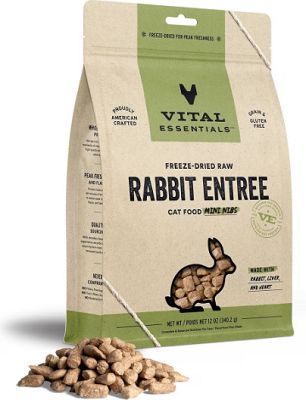
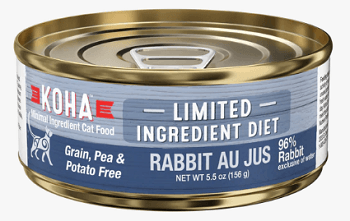
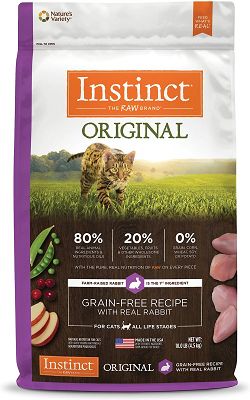
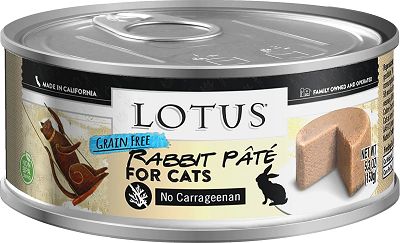
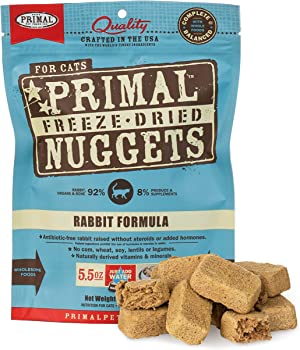
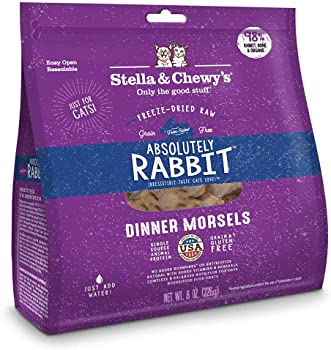
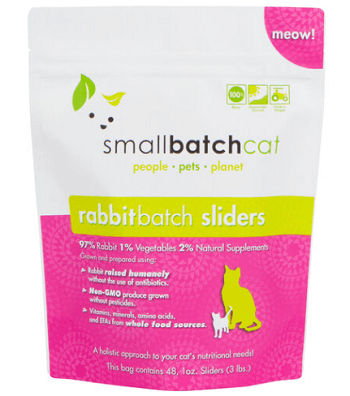
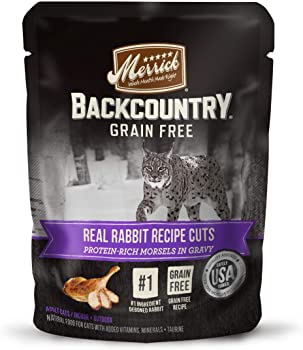

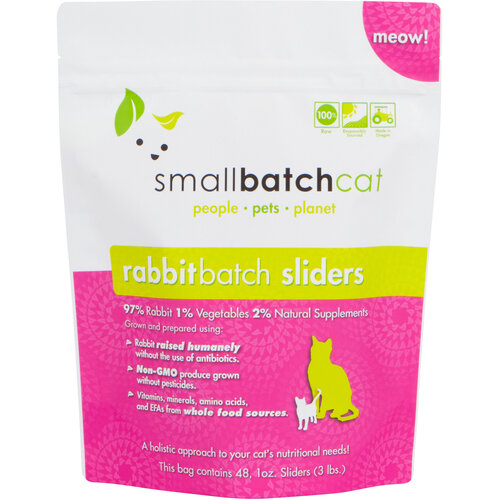
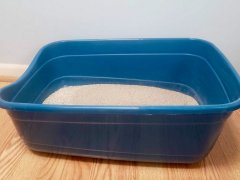
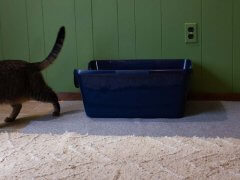
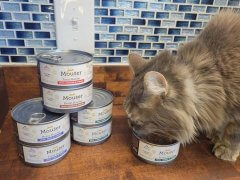
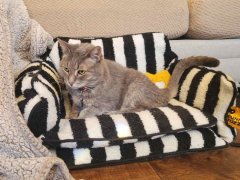


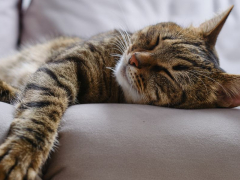
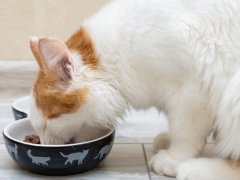
Our cat has poultry allergies that surfaced after 5 years and caused excessive licking, chewing etc. We tried duck for awhile but that too made his licking come back.
We have been using Rawz wet rabbit food for about 6 months. Says it’s 96% rabbit and seems to do the trick. He was on Rayne rabbit maintenance (in Canada must purchase through a vet) for 1+ years but out of the blue they stopped making that formula and brought out a new one (with red pepper of all things).
These are both super expensive but at least Rawz is available at a pet store. Rawz doesn’t do a dry rabbit food, so still looking for a good dry, we use Instinct limited ingredients in the meantime.
Just thought I’d share, so hard to find appropriate food for limited ingredient diets.
My cat has allergies and o my eats rabbit but now she has kidney issues and needs lower phosphorous foods. I haven been able to find one! Any thoughts?
Hi there! Rabbit is one of the highest-phosphorus meats, so it can be hard to find a low-phosphorus/renal food with rabbit as its primary protein source. You may want to talk with a vet or another expert consultant about the possibility of using a phosphorus binder along with a rabbit-based food.
Thank you for this very interesting paper !
Any thoughts about Rawz Rabbit canned food and Rayne Nutrition Rabbit Dry food . Our cat is struggling with allergies, and these seam mostly allergens free . Many thanks !